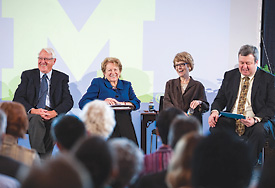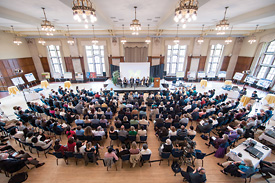President Mary Sue Coleman celebrated U-M’s teaching innovations while calling on educators to dig deep to overhaul undergraduate education for the 21st century. The president spoke during an event celebrating the 50th anniversary of the pioneering Center for Research on Learning and Teaching (CRLT).
Before national educators gathered Friday in the Michigan Union, Coleman said the teaching community must work to elevate and expand classroom, field and laboratory experiences. She said learning must be engaging and active to produce graduates with the confidence to innovate, be entrepreneurial and reinvent themselves.
“It means more team teaching and more faculty willing to collaborate. Flipped classrooms and courses that cross academic boundaries. Creative performances and service learning. More programs that integrate coursework, fieldwork and service,” she said.
“Learning must encourage and develop creativity. It needs to be global. And to be truly effective, how students learn and how faculty teach must be measured, evaluated and rewarded by the very universities that say undergraduate teaching is important.”
While CRLT’s mission is to promote excellence and innovation at U-M, its impact is broader, Coleman said.
“Faculty and administrators from more than 100 colleges throughout the world turned to CRLT for support in the past year alone,” Coleman said. She added that resources offered on its website draw more than 275,000 unique visits from 200 countries each year. This activity, she said, demonstrates a hunger to improve teaching.
Following her talk, the president hosted a panel on Enriching Undergraduate Learning at Research Universities. Panelist Carol Geary Schneider, president of the American Association of Colleges and Universities, supported Coleman’s focus on undergraduate education.


Panelists Stanley Ikenberry (from left) and Carol Geary Schneider share a laugh with President Mary Sue Coleman and moderator Scott Jaschik during the Center for Research on Learning and Teaching 50th anniversary program.
Educators from around the country gather in the Michigan Union Rogel Ballroom for a panel discussion presented as part of an event marking the 50th anniversary of the Center for Research on Learning and Teaching. Photos by Austin Thomason, Michigan Photography.
“The intersection of technology and liberal arts — that’s been the source of creativity and leadership for the American economy and, I would argue, American democracy,” Schneider said.
Panelist Stanley Ikenberry, former president of the University of Illinois and the American Council on Education, said undergraduate education is the building block for universities. “It is the lens that society uses to view us, understand us and support us. It is through undergraduate education that we are touching lives and influencing society.”
Among models of innovative teaching efforts spawned at U-M, Coleman lauded the work of Kathleen Sienko, assistant professor of biomedical engineering in the College of Engineering, and her undergraduate students. To develop a medical device to best serve women patients, Sienko’s students lived, learned and worked in Ghana. They also talked to women to create easy-to-use devices safe for both mother and baby.
“This is powerful teaching. It’s global, it encourages students to think outside their comfort zone, and it’s hands-on. Most important, it advances the public good,” Coleman said.
Panelist Shirley Malcom, who heads the Directorate for Education and Human Resources Programs of the American Association for the Advancement of Science, said she loved Coleman’s Ghanian example. “Students need to have a sense of social justice and a global perspective. (They need to) learn how you can take on a project and actually engage on that project together to promote some long-term social good,” she said.
Panelist Mika LaVaque-Manty, Arthur F. Thurnau Professor, and associate professor of political science and philosophy, LSA, said that for meaningful curricular and institutional change, the focus should shift from information delivery to inquiry and problem solving. “That’s what I hear President Coleman saying when she stresses undergraduate education. I think we can make this shift,” he said.
Coleman said research universities are in a tremendous position to give undergraduates meaningful experiences because the talent and resources these universities contain — in medicine, engineering, public policy and social science — should inform and inspire undergraduate teaching.
“Our graduates must be able to work effectively with others who are different from themselves and in settings that are much different than anything they’ve experienced. This is not a luxury, but rather a requirement for personal and global prosperity,” Coleman said.
She added that U-M is putting more emphasis on pulling together these resources for the benefit of undergraduates, in science, technology, engineering and mathematics (STEM) fields, the humanities and beyond.
To further support undergraduate education, Coleman said LSA has begun a new undertaking called the Sophomore Initiative, targeting students at a time when they wrestle with determining the direction of their education.
“Sophomore year is when students are up to speed, when they are thinking hard about the future, and when the possibilities suddenly open up. If we can grab them at that moment with the right stuff, their minds take off,” Coleman said. “We want to engage them, build their creativity and show them the intellectual depth and rigor of the academy.”
Provost Phil Hanlon told the anniversary gathering that today’s graduates need to have the confidence to take risks and to innovate.
“They need to be lifelong learners and be able to reinvent themselves,” Hanlon said. “You have to get out and do things. We’re going to need CRLT more than ever to support and evaluate our efforts to make this a reality.”

